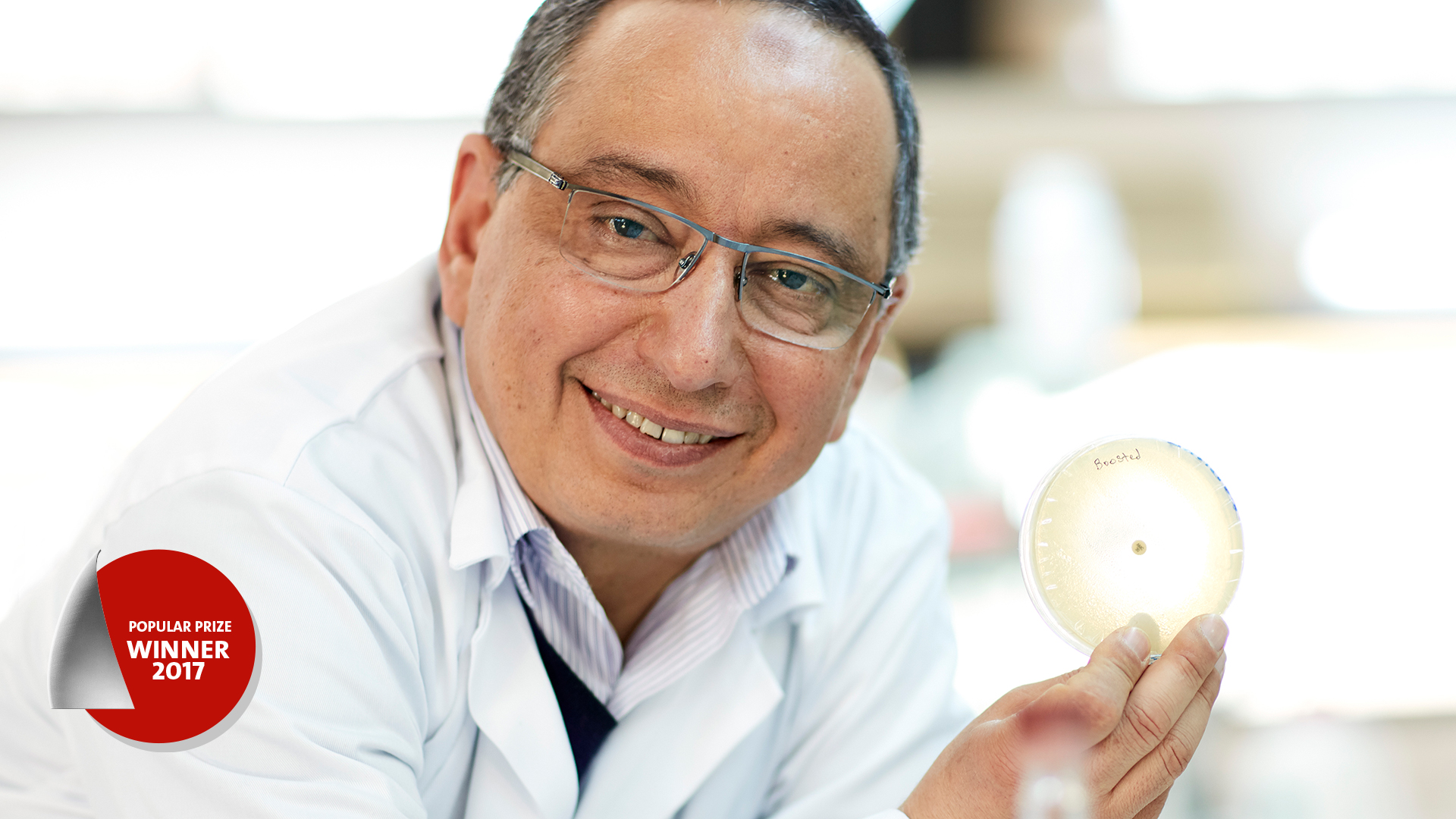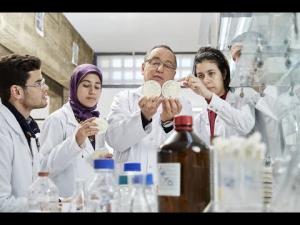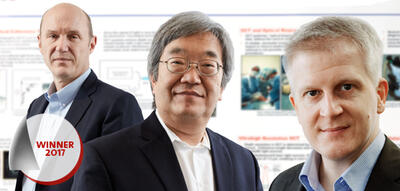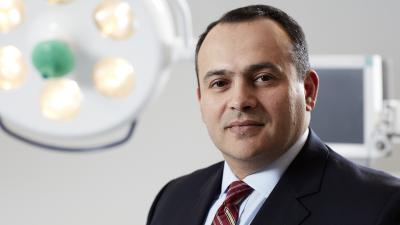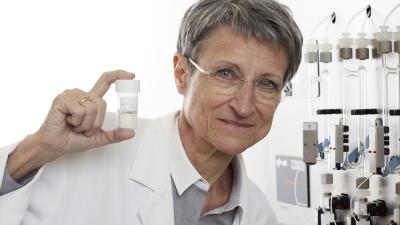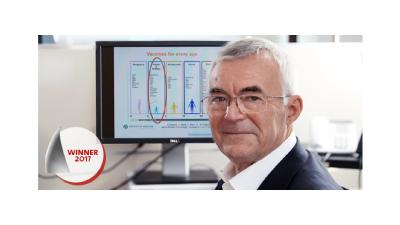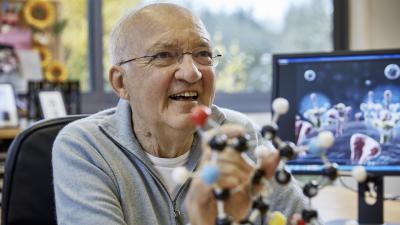Adnane Remmal
Boosting antibiotics with essential oils
Winner of the European Inventor Award 2017 in the Popular Prize category
Working at the Université Sidi Mohamed Ben Abdellah in Fez, Morocco, Remmal had his eyes on one of the biggest threats to modern medicine: the increasing number of bacteria that have grown resistant to antibiotics. The answer, he reasoned, might come via the distinctive local plant life that has long supported regional traditions of distilling flowers and other plants to make flavourings and teas.
Remmal was aware that many plants have antimicrobial, antiparasitic and antifungal properties, but he also knew that when used in doses strong enough to have their intended effect, they often induce side-effects such as headaches and nausea, rendering them impracticable for medical use. His solution was to build upon the inherent strengths of both antibiotics and natural essential oils, combining them to increase effectiveness beyond what either offered independently, while simultaneously avoiding any unpleasant side-effects.
Remmal's development, which he began refining in the mid-1990s, was patented by the EPO in 2014 and gave rise to a new drug that is currently in the final stages of clinical trials. Expected to enter the market in late 2017, the drug is part of a two-pronged approach using essential oils to help solve the problem of antimicrobial resistance. In addition to his natural antibiotic booster, Remmal has also invented a natural supplement made from natural essential oils that replaces antibiotics and other chemicals in animal feed. The overuse of antibiotics in intensive livestock and farming practices is seen as a major contributor to the rise of drug-resistant bacteria.
Societal benefit
The World Health Organisation as well as a number of other actors and governments have made bacterial resistance a top priority. The global scale of the problem makes it difficult to address. Globally, drug-resistant infections cause around 700 000 deaths per year. This could skyrocket to 10 million annually by 2050 if a new generation of antibiotics is not developed. This is what makes Remmal's invention so relevant. Remmal's newly-developed drug has been shown to attack moderately and highly resistant bacteria more efficiently than standard antibiotics, without side-effects and resistance build-up. It may not only help to better contain disease-causing microbes, it could also help slow the rate at which we need to develop new antibiotics.
Moreover, Remmal's natural livestock feed supplement tackles another major contributor to the problem. Around half of the world's antibiotics production (including antibiotics critical to human health) is used for livestock feed. In sub-therapeutic doses, these antibiotics promote growth in livestock, but they also allow bacteria to survive and develop antibiotic resistance. These hardened microbes can be transmitted directly through food - as is the case with antibiotic-resistant strains of Salmonella and Escherichia coli (E. coli). They might also multiply in the runoff from wastewater and watering troughs.
Remmal's formula for animal feed can be added using the typical feed preparation processes, and has been shown to be just as effective as standard antibiotics without causing side-effects or contributing to resistance build-up.
Economic benefit
The European Commission estimates that extra healthcare costs and productivity losses related to infections from resistant bacteria amount to at least EUR 1.5 billion per year. The World Bank released a 2016 report calculating that by 2050 the impact of drug-resistant bacteria on global healthcare costs could range from EUR 283 billion to more than EUR 984 billion per year. Part of the problem is that creating each new synthesised antibiotic might cost EUR 500 million to EUR 1 billion. And these new drugs carry with them possibilities of new resistance, unknown side-effects and toxicity, along with the risk that the time and effort invested will not produce significant returns.
Currently in the final stages of clinical trials, Remmal's "boosted antibiotics" are expected to be market-ready in late 2017. Because they use natural molecules that are already tested and approved in the pharmaceutical industry, the new drug is inexpensive to produce and can be sold at an affordable price.
In 2004, Remmal founded a start-up company to bring his pharmaceutical and veterinary medicine applications to market. The company has since filed for four patents to protect the concept of boosting anti-infectious agents. His start-up has attracted the attention of the leading pharmaceutical laboratory in Morocco and West Africa, which has made technical and financial investments to bring "boosted antibiotics" to market.
How it works
There are over 100 different antibiotics divided into several classes, each with their own specific method of operation. In general, antibiotics exploit bacteria's weaknesses by destroying their cellular walls, preventing them from repairing damaged DNA or stopping them from reproducing.
Remmal draws a comparison between an antibiotic's molecular working principles and a key unlocking a door: "When the key unlocks the door, the bacteria die. However, when a mutation slightly changes the lock's shape, the key can no longer open it and the bacteria become resistant."
By "boosting" the antibiotic with the natural oils, Remmal says he has developed a key that not only opens the lock but completely destroys the door.
Remmal's special key combines existing, standard antibiotics - such as penicillins, cephalosporins and even MRSA antibiotics for difficult-to-treat infections - with the natural antimicrobial properties found in local plants. The interaction between natural "booster" molecules and the antibiotic molecules creates "molecular complexes" that are not easily recognised by bacterial resistance mechanisms. This creates an effective treatment for infections and makes it very difficult - and perhaps impossible - for bacteria to develop an effective resistance.
The inventor
Remmal studied biology at the University of Fez and was invited to pursue his studies in the leading scientific centre of Orsay (University of Paris XI) in 1982. He received a postgraduate diploma in electrophysiology and cardiovascular pharmacology as well as a PhD in molecular pharmacology (1987), while working with research teams headed by Edouard Coraboeuf and Philippe Meyer.
Declining offers to stay in France after receiving his doctorate, Remmal decided to return home, share his passion for research with his Moroccan students and participate in the scientific and technological development of his country. Remmal became a professor and researcher at the University of Fez in 1988, and his first results in fundamental research on the antimicrobial activity of essential oils earned him a second PhD in microbiology in 1994.
Remmal was honoured with the Innovation Prize for Africa in 2015, an award from the African Innovation Foundation, for his plant-extract-based feed supplement for livestock.
Did you know?
Remmal joins a long list of other European Inventor Award finalists and winners who took their inspiration from nature to develop innovative solutions. Danish inventor Peter Holme Jensen and his team at Aquaporin (2014; SMEs - winners) mimicked the natural transport of water between cells to develop an energy-efficient water purification membrane. The targeted use of natural compounds to treat a variety of conditions is the hallmark of Ivars Kalvins (2015; Lifetime achievement - finalist). Dutch researcher Hendrik Jonkers (2015; Research - finalist) added limestone-producing bacteria to develop a self-healing bioconcrete.
Media gallery
Patent numbers:
Contact
European Inventor Award and Young Inventors Prize queries:
european-inventor@epo.org Subscribe to the European Inventor Award newsletterMedia-related queries:
Contact our Press team#InventorAward #YoungInventors
